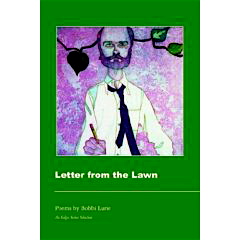~PEGGY MILLER~
THE
POETRY OF THE OBSERVER: BOBBI
LURIE’S LETTER
FROM THE LAWN
There are many ways to be separate,
and
Bobbi Lurie examines them
in her new
book Letter
from the Lawn.
Perhaps the poet must always write from
the condition of solitude so that thoughts will knit themselves
together in the interstices of existence. This generated, private
space affords a share of necessary perspective, and perhaps — rather
than the muse — it mothers new poems.
Of course, the natural human condition is one of
nearly insurmountable isolation. I have expressed it as an
imprisonment in the skull, an inability to get into the minds of
others, but that is an oversimplification. Humans need bodily
proximity. We need to associate with other people. We need
relatives and lovers. We need audiences and music and store
clerks with smiles, because loneliness is a disease that is unbearable
and can be fatal. audiences and music and store
clerks with smiles, because loneliness is a disease that is unbearable
and can be fatal.
There are many ways to be separate, and Bobbi Lurie
examines them in her new book Letter
from the Lawn. The book opens with separateness.
“Suburban Hermits,” in their manifest isolation, “tinker in their tool
sheds.” In “Weeding,” the discomforts of gardening are suffered,
and we see the classic separation between people and nature, which
“loves weeds more than flowers.” How strange and pervasive it is
to feel so apart from nature — so much at odds with our origins.
In “Only at Dusk Is It Possible to Love the
Landscape,” once again the scene is a suburban neighborhood. This
time the neighborhood imprisons the woman in her house, and comfort is
sought in that isolation: “the prettiness of the kitchen increases when
i think of the neighbors who hate us. The poem concludes:
“i
dread the days. / the nights so fearfully quiet.” And in the
title
poem, the voice — which is the lawn—or it is ‘B’ writing from her
position on the lawn — is alone: “Dear Green, / I sit in the back
with my book . . . / The separateness is so intense.”
As the book turns to other subjects the separateness
seems to become buried, and more sunken into experience, but never
ceases to be the horizon note. “Linoleum” is an intriguing
poem. We see the husband and wife chopping vegetables and
sautéing garlic for dinner. The poem begins, “He is
standing in his kitchen laughing with his wife about me.” Here is
the separateness of observing as life happens, yet in this poem
the observer imagines herself to be there ethereally, a subject in the
minds and words of the couple.
It is the condition of being outside where the
author finds inspiration, and even comfort. This is clear in “The
Door Opens Slightly.” The observer peeks through the cracked door
to see a tenderness between lovers, a moment not intended to be
watched. They sit at a table set with one coffee cup. The
woman stirs the man’s coffee. She kisses him “softly // as if his
lips / are sacred texts.” But the scene, so much like a movie,
is brief. Wind closes the door and the observer is left standing…
“like space // between trees,” never the doer, always the
watcher.
She cannot act as a delicate lover, cannot seem to possess a moment of
acute tenderness, but she recognizes the occasion, is riveted, and
reveals it to her readers.
Letter from the
Lawn is a fine book of poetry with much more to be discovered in
the reading. The wisdom of this book is found in the way the
author remains in her loneliness, or separateness, or isolation.
She remains the still observer, making time or space the separation
that colors her subjects poetic.
Letters from the Lawn,
Bobbi Lurie. Custom Words, 2006. ISBN:
1933456264 $17.00
© by Peggy Miller

|


![]()
![]()
![]()
![]()